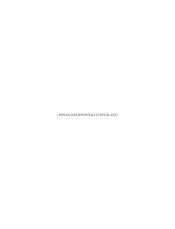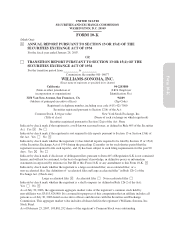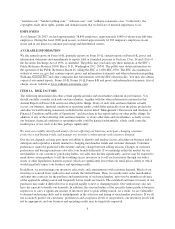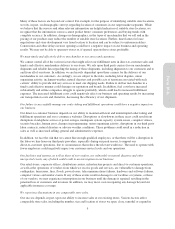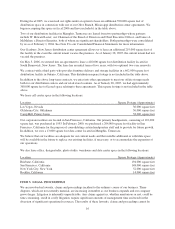Pottery Barn 2006 Annual Report Download - page 20
Download and view the complete annual report
Please find page 20 of the 2006 Pottery Barn annual report below. You can navigate through the pages in the report by either clicking on the pages listed below, or by using the keyword search tool below to find specific information within the annual report.business. Our vendors’ failure to manufacture or import quality merchandise in a timely and effective manner
could damage our reputation and brands, and could lead to an increase in customer litigation against us and an
attendant increase in our routine litigation costs. Further, any merchandise that does not meet our quality
standards could become subject to a recall, which would damage our reputation and brands, and harm our
business.
Our dependence on foreign vendors subjects us to a variety of risks and uncertainties.
In fiscal 2006, we sourced our products from manufacturers in 39 countries outside of the United States.
Approximately 62% of our merchandise purchases were foreign-sourced, primarily from Asia and Europe. Our
dependence on foreign vendors means that we may be affected by declines in the relative value of the U.S. dollar
to other foreign currencies. For example, any upward valuation in the Chinese yuan against the U.S. dollar may
result in higher costs to us for those goods that we source from mainland China. Although approximately 95% of
our foreign purchases of merchandise are negotiated and paid for in U.S. dollars, declines in foreign currencies
and currency exchange rates might negatively affect the profitability and business prospects of one or more of
our foreign vendors. This, in turn, might cause such foreign vendors to demand higher prices for merchandise,
delay merchandise shipments to us, or discontinue selling to us, any of which could ultimately reduce our sales or
increase our costs.
We are also subject to other risks and uncertainties associated with changing economic and political conditions in
foreign countries. These risks and uncertainties include import duties and quotas, concerns over anti-dumping,
work stoppages, economic uncertainties (including inflation), foreign government regulations, wars and fears of
war, political unrest, natural disasters and other trade restrictions. We cannot predict whether any of the countries
in which our products are currently manufactured or may be manufactured in the future will be subject to trade
restrictions imposed by the U.S. or foreign governments or the likelihood, type or effect of any such restrictions.
Any event causing a disruption or delay of imports from foreign vendors, including the imposition of additional
import restrictions, restrictions on the transfer of funds and/or increased tariffs or quotas, or both, could increase
the cost or reduce the supply of merchandise available to us and adversely affect our business, financial condition
and operating results. Furthermore, some or all of our foreign vendors’ operations may be adversely affected by
political and financial instability resulting in the disruption of trade from exporting countries, restrictions on the
transfer of funds and/or other trade disruptions.
In addition, although we continue to improve our global compliance program, there remains a risk that one or
more of our foreign vendors will not adhere to our global compliance standards such as fair labor standards and
the prohibition on child labor. Nongovernmental organizations might attempt to create an unfavorable impression
of our sourcing practices or the practices of some of our vendors that could harm our image. If either of these
occurs, we could lose customer goodwill and favorable brand recognition, which could negatively affect our
business and operating results.
The growth of our sales and profits depends, in large part, on our ability to successfully open new stores.
In each of the past three fiscal years, the majority of our net revenues have been generated by our retail stores.
Our ability to open additional stores successfully will depend upon a number of factors, including:
• our identification and availability of suitable store locations;
• our success in negotiating leases on acceptable terms;
• our ability to secure required governmental permits and approvals;
• our hiring and training of skilled store operating personnel, especially management;
• our timely development of new stores, including the availability of construction materials and labor and
the absence of significant construction and other delays in store openings based on weather or other
events;
• the availability of financing on acceptable terms, if at all; and
• general economic conditions.
8


